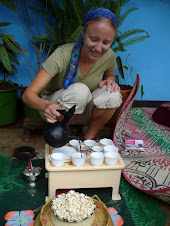It would, of course, be stating the obvious to say that things here in
Sometimes, though, a situation arises in which the potential implications are much greater than those of consumerism or concepts of time, and in which cultural mores seem not just different and quirky but possibly detrimental. These are the situations that raise difficult questions about which cultural mandates to accept and work within, and which to challenge. What is the limit of my right as a guest in this culture? What is my obligation as a volunteer working against the devastation caused by poverty and AIDS?
I was sitting in on an HIVAIDS workshop for local government leaders from the wider administrative zone, when one older man spoke up to make the argument that a woman who dresses provocatively is asking for men to have sex with her. I listened as he went on to blame globalization and increased exposure to the sexy dressing styles of foreigners for this problem, and I began to notice heads in the crowd turning in my direction, some nervously, some excitedly curious to see how the foreigner among them might react to this charge. The women's rights activist in me, as well as my sense of personal pride, wanted to stand up in the middle of the assembly to refute the charges now leveled doubly, though admittedly indirectly, against me, first as a woman and second as a foreigner. The public health worker in me was analyzing the cultural challenges to HIV/AIDS prevention measures implied in the man's statement. The rugged American individualist in me was formulating a speech that lauded the human ability to CHOOSE, rather than react, and stressed the importance of taking responsibility for one's own actions. My more prudent side, though, urged me to consider that I had a mere four weeks of experience in Debremarkos and was still working to integrate into the community; that I didn't have the sort of trust relationship with these largely unfamiliar government leaders that would have prevented me from being seen as an outsider; that there was a handful of Ethiopian women among the overwhelmingly male group who seemed ready to voice their opinions on the issue; and that at this stage, with little Amharic language and little knowledge of the community's workings, I was still largely a guest, observer, and student in a discussion that was rightly theirs. (The realist in me also chimed in with, "Sure, go ahead, Christen, launch into a diatribe about responsibility for individual decisions, the dangers of eternally blaming one's environment, and the innocence of the victim…in AMHARIC." The realist in me is terribly sarcastic.)
In the end, I let my obviously disgruntled and disappointed silence in front of my expectant onlookers express my disagreement with what was being said around me. And to gather my thoughts and rein in my emotions, during the tea break I visited a local friend at her family's café – where I was subsequently harassed by a heavy-set middle-aged man, drunk at
It is easy to lay blame upon environment. It is easy to blame a chauvinistic culture for victimizing women. It is easy to blame a society exalting individual expression and "liberation" for the deterioration of traditional morality. But having acknowledged that none of us make our choices in a vacuum, in doing so we also acknowledge that we do make choices, for which we are personally responsible. And ultimately, through a critical mass of these individual choices, it is possible even to change the environment in which these choices are made. Lasting cultural change must come from within. But when two different cultural environments meet, in an ideal world, the fair, open, humble exchange that would take place would serve to more fully inform the individual choices made within each culture, possibly leading to cultural changes to the benefit of both.

No comments:
Post a Comment